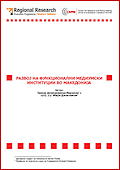
We kindly inform you that, as long as the subject affiliation of our 300.000+ articles is in progress, you might get unsufficient or no results on your third level or second level search. In this case, please broaden your search criteria.

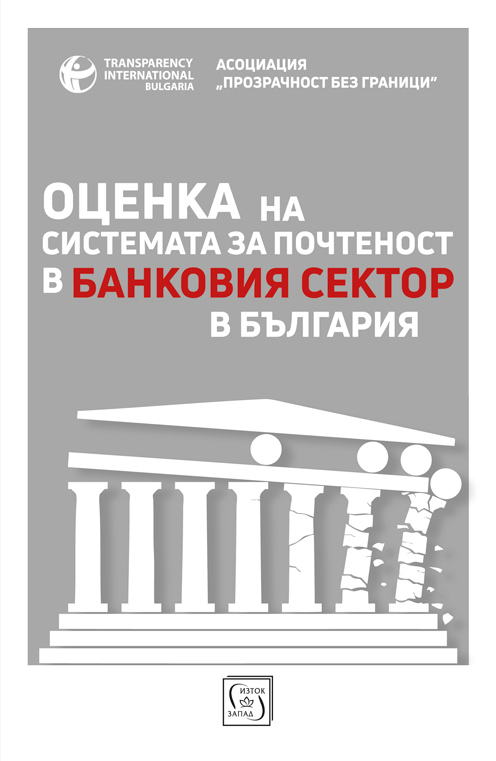
This study is provoked by one of the most significant cases of abuses over the last two decades in Bulgaria - the bankruptcy of CCB (Corporate Commercial Bank), the fourth largest bank in the country. After the 1996-1997 crisis, when one third of the banks went bankrupt, the country's banking sector collapsed. This is the second case in which huge financial resources "evaporated" and the negative consequences affected a wide range of public institutions and private subjects. The emergence of periodically recurring financial crises, with multiple impacts on public, economic and political life, motivates Transparency International Bulgaria to look for a systematic response to the problem and look beyond the specific case. The present book is based on the analytical approach of the international anti-corruption organization Transparency International "National Integrity System" which assesses clearly defined criteria, the capacity, functioning and management of sectors and institutions with key importance in counteracting corruption. The study is based on an analysis of the legislation and practical actions of the investigated institutions, a wide range of documentary sources, reports, assessments, media publications, and interviews with experts and public figures that have had direct observations and touch with the CCB case. It reflects an attempt to formulate an impartial, objective assessment of the functioning of the banking supervisory system in the 2009-2014 periods but also pursues another objective - to serve as a starting point for policies and strategic actions to give an adequate systemic response to established deficits. Viewed through this prism, this publication expresses the ambition of the Transparency International Bulgaria to not only prevent future crises of this nature, but also to contribute to the institutional strengthening of the system of supervisory institutions in Bulgaria.
More...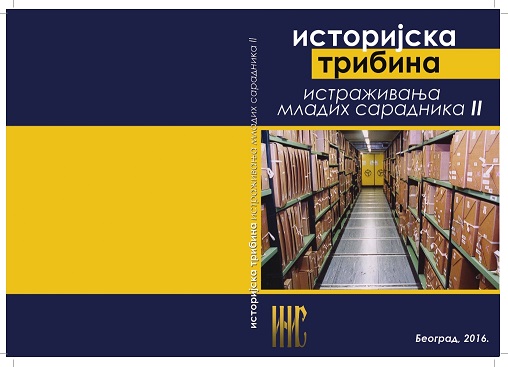
Sport, and football in particular, became very important factors in the social life of the 20th century Serbia and Yugoslavia. Because of its significance and influence on the masses, football was under heavy pressure of the political establishment throughout the century and those political factors tried to use football for their own political goals. The policy of football control which existed in pre-WW II Yugoslavia and during the war and occupation was continued during socialism. The communist authorities abolished the „bourgeois” sporting system and tried to build their own, using constraint, ideological indoctrination and propaganda. The popular notions of footballers were created and promoted by the controlled media, such as the press and the radio, and those notions were accepted by the public as completely true. Narratives which suited the authorities, such as the one about Stjepan Bobek and Rajko Mitić, which promoted and symbolized the idea of „Brotherhood and Unity”, camaraderie, modesty and willingness to work hard, were constantly present in the public sphere. The seamy side of Yugoslav sport, such as misconduct of sportsmen, ethnic tensions and moral and political corruption, were hidden away from the public. Using the propaganda, in the late 1940's and throughout the 1950's, the notion was created that footballers were model youths and upstanding and worthy members of the socialist community. In the 1960's there was a major shift in the popular views on football and footballers. The public generally focused more on the negative sides of football and footballers who were outside the box and who broke the standard patterns of behavior generally accepted in socialist Yugoslavia. During the 1960's a few footballers emerged who were both loved and hated by the press and by the public alike, such as Dragoslav Šekularac from the „Crvena zvezda” football club. He was probably the first real superstar of Yugoslav football. The causes of this shift in perspective were numerous, most notably larger accessibility of the media content to the average Yugoslav, but also the general trend of liberalization of the public sphere in 1960’s Yugoslavia, which allowed the press to write more freely. The consequences of such a change were numerous, the most important being that the Yugoslav football was rarely used in state political propaganda in the coming years. The football public became more critical and the negative trends in football more visible, making thus the further development of Yugoslav football more similar to that in the rest of Europe and of the world.
More...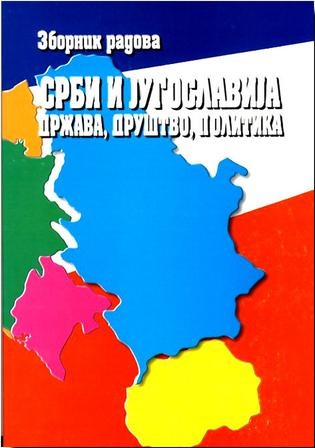
The paper analyzes the oratory of the Prime Minister of the Government of the Kingdom of Yugoslavia, Milan Stojadinović during the parliamentary election campaign in 1938. During the campaign Stojadinović held speeches at nine large rallies. In most of them certain composition can be detected. The first part comprized praises of the people and the area where the rally was being held. The second part explained what the situation in the country had been at the time the Stojadinović government took over. The third part presented the results of the government’s policies, the fourth was the critique of the opposition. The final part contained a call to vote for the Stojadinović ticket, seasoned with new promises. The speeches were attuned to the audience and were full of demagogy, but also of cleverly used phrases and popular proverbs. The length of certain parts of speeches depended on the proximity of the elections. Thus the critique of the opposition, which originally comprized smaller part of the talks, became the central part of speeches at the last rallies. The topics about which the Prime Minister spoke were constantly brought up to date with the current situation in the country and in the world. Milan Stojadinović possessed considerable gift of oratory but it could not ensure his staying in power under the difficult political and economic conditions prevailing in the then Kingdom of Yugoslavia.
More...
In this edition of Robotrolling, we expose a coordinated network of bots on Facebook, Twitter, and VK connected to a militaristic YouTube channel. Through our analysis, we discovered that the group of automated accounts is used to spread anti-NATO videos in the pro-Donbass information space. Our findings demonstrate that the video-sharing platform is a ripe target for robotic exploitation. During this period, the level of Russian-language bot activity decreased on Twitter. Meanwhile, English-language bot activity remained unchanged. On VK, the volume of messaging increased by 8%. Nearly a quarter of unique users engaging with NATO-related topics were identified as bot accounts. Russian- and English-language conversations about the NATO presence in the Baltic States and Poland peaked on 13 August on both Twitter and VK. On Twitter, English-language bot and anonymous accounts targeted Poland, while the Baltic States received the majority of Russian-language bot attention. Events commemorating the 80th anniversary of the Second World War attracted significant levels of fake engagement throughout the monitoring period. We observed two recurring anti-NATO narratives circulating in this context: (1) NATO is occupying the Baltic States and Poland, and (2) NATO supports fascism. Finally, this instalment of Robotrolling provides a glimpse into the flourishing world of commercial social media manipulation or, put simply, bots for hire. In a forthcoming report, we measure the inability of Facebook, Instagram, YouTube, and Twitter to counter online manipulation.
More...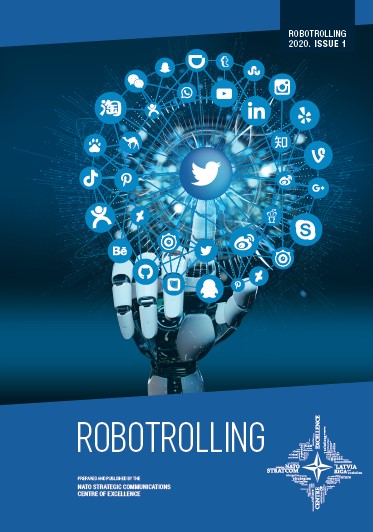
Inauthentic English- and Russian-language conversations on Twitter about the NATO presence in Poland and the Baltic States peaked on 4 and 5 December, respectively, coinciding with the 2019 NATO Leaders’ Meeting in London. Robotic accounts focused heavily on the meeting this quarter, particularly on English-language Twitter, which saw roughly 3 times the usual level of bot activity. On VK, an anomalous increase in activity from anonymous human-controlled accounts coincided with the meeting. Due to the contentious atmosphere surrounding the meeting in London, a considerable increase in the proportion of posts generated by bots was observed on English-language Twitter this quarter. At the same time, Russian-language bot activity on Twitter decreased to the lowest level observed thus far. In this issue of Robotrolling, we dig deeply into a sample of political pages amassed by a COE report on commercial social media manipulation in order to identify patterns in inauthentic activity on Facebook. We demonstrate that the 2019 elections in Ukraine were the primary focus of actors willing to pay for inflated social media engagement. Our analysis also reveals several shared traits among political manipulators on Facebook and provides a network visualisation that shows the connections between them. As a new year of Robotrolling begins, we review trends observed in VK groups over the past 18 months. A steady reduction in the proportion of content shared in communities dedicated to the so-called Novorossia region and the Donbass coincides with inauthentic content increasingly being posted in community spaces such as private groups or pages.
More...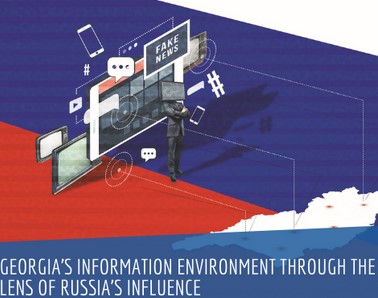
The aim of this chapter is to describe and contextualise the key stories that circulate in the broadcast and online media, shaping Georgian public discourse. We analyse the Georgian information domain, including the patterns of information flows and their content, media, and messages. This analysis is conducted through the lens of Russia’s strategic interests and influence activities in Georgia. The ongoing hybrid war waged by Russia against Georgia includes information attacks and disinformation, which is identified in official documents of the Georgian government as the one of the main threats to national security. We analyse the power and extent of Russian intervention within the Georgian information domain.
More...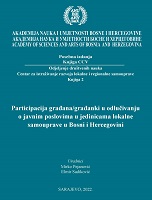
Živimo u vremenu “informatičke revolucije” i svekolikog dinamizma u načinu življenja. Relativiziraju se i vrijeme i prostor. Postajemo sve zavisniji od drugih, ali uz paradoksalnu umišljenost kako smo, istovremeno, sve samodovoljniji unutar svijeta kome pripadamo. To direktno protivriječi prirodi ljudskog roda. Jer, koliko god je važna individualnost, tj. unikatnost svakog čovjeka, pa čak i kada je tzv. sijamski blizanac, jednako tako je bitna i društvena komponenta njegovog bića. Zapravo, osim zadovoljavanja svega nekoliko čisto egzistencijalnih potreba, sve drugo što činimo tokom svoga života smisleno je samo u sadjejstvu sa drugim ljudima. Ali, to je već tema za sebe kojom se nećemo baviti u ovom tekstu.
More...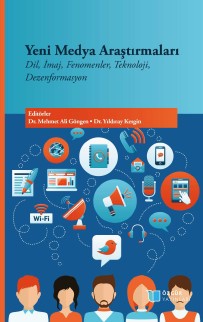
Public policy analysis is a social science discipline applied to better understand the policy-making processes and their consequences. In this study, it is aimed to reveal the analysis of the official multilingualism policy by examining the reasons, stages and results of the applied policy. Language policy is a component of public policy studies, and country-by-country review and planning of language policy make an important contribution to this topic. This study firstly addresses the classification of language policy tools and how they are used as a public policy tool. Then come its examination, classification in the public policy of the Republic of South Africa and the interpretation of its results. This article contributes to research on the development, implementation and consequences of language policy by discussing the place of the concept of official multilingualism in public policy and how it can be adapted to research. In other words, it is about examining the concept through a case analysis after the thematic analysis performed in the study. Then, a method is created to compare and examine language policies through the example of the Republic of South Africa. Max Weber suggests that language invites to unification but does not enforce it in the process of nation formation. The South African Republic, described as ‘Rainbow Nation’, accepted the invitation of various languages and combined it in the constitution as the common text. In addition, official languages were established in the provinces in proportion to their populations and became practicable in the entire state apparatus including the fields of education, health and communication. The language(s) harboring diversity and secessionism thus became the cement for the coexistence of various communities. The main objective with the recognition of 11 official languages is to prove that language would grow secessionist once ostracized, but associative once included in the state. Official multilingualism is the greatest inspiration for various communities to live in the same country without losing the sense of belonging and to hold on to the commitment for coexistence in spite of all the problems experienced in society.
More...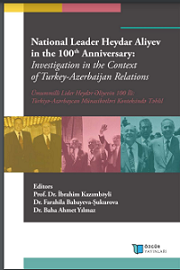
Tarih boyunca, bireylerin bir arada yaşamalarına öncülük eden, farklı zamanlarda veya şartlarda ortaya çıkan ve içerisinde bulunduğu grup ya da toplumu ardından gelmeye ikna eden “lider” kişiler olmuştur. Değişen şartlara karşı, liderlik ettiği toplumu kontrol edebilecek, bir arada olmanın gereklerini takip edebilecek ve bunun devamlılığı konusunda stratejiler üretebilecek bir lider ideali tüm toplumların ortak beklentisi olarak görülmüştür.
More...
Geçmişten günümüze sosyal bir varlık olan insan, varlığını sürdürebilmek ve diğer insanlarla etkileşim kurabilmek adına iletişim faaliyetlerine büyük önem göstermiştir. İnsanların sosyal bir varlık olduğunu ve bireyin sosyalleşmesinde iletişimin önemli ve etkin bir araç olduğunu tarih boyunca pek çok düşünür çeşitli şekillerde ifade etmiştir. Dolayısıyla tarih boyunca çeşitli şekillerde devam eden iletişim biçimleri, insanlar arasında bir ortaklığı da beraberinde getirmiştir. Ortaya çıkan bu ortaklık neticesinde, bir arada yaşayan bireylerin oluşturduğu toplum ve toplumsal düzenin oluşmasının kaçınılmaz olduğu söylenebilmektedir. Bu bakımdan, insanın oluşturduğu toplumsal düzen içerisinde, bir aradalığı sağlamak ve toplulukları kontrol edebilmek için bireyler kendi aralarında bir lidere veya yöneticiye ihtiyaç duyduğu görülmektedir.
More...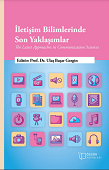
Media and the field of journalism are dynamically interconnected with other social structures and actors from a sociological perspective. It is possible to address this relationship at the macro or micro levels from the perspective of the social capital approach. Social capital has social implications as potential resources embedded within actors' communication networks, serving as a cohesive element that holds society together, such as individual trust levels. Regardless of the perspective from which it is taken, the social capital approach has a direct and reciprocal relationship with the fields of communication, media and journalism. Important theorists examine these relationships. The study aims to reveal the connection points between the field of media and journalism and the social capital approach on the axis of the evaluations of Tocqueville, Putnam and Bourdieu. Firstly, the topic is approached in the context of Tocqueville's evaluations on the relationship between civil society and the press in his work 'Democracy in America'. Then, Robert Putnam's perspective in line with the work of communication theorist George Gerbner, especially in the context of television viewership and its effects on social capital, was analyzed. Thirdly, an association was made between Pierre Bourdieu's idea of 'journalism and the media field' and his unique capital approach. The following conclusions were reached within the framework of the views of the three theorists: 1) The media can contribute to social capital by enabling civil and political components of society to dialog. 2) Media and journalism production practices affect social capital to the extent of their determining influence on people's perceptions. 3) The fact that media viewing is one of the most important leisure time activities leads to changes in civic and political participation. 4) Actors/perpetrators working in the media benefit from their social capital in their productive activities in the field. 5) Journalist actors/perpetrators perceive social capital within their own sociality and their journalistic perceptions and practices are shaped accordingly.
More...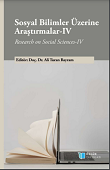
The concept of post-truth, which is among today's political discourses and has rapidly spread in many languages, has now entered our lives as an indispensable element of popular politics. Among the main factors in the emergence of the concept of post-truth is the increasing number and use of false / incomplete / false news that politicians say to market themselves during election periods. The concept of post-truth has been frequently discussed in the international literature in recent years and has entered the political life and literature of Turkey today. In this respect, it can be stated that post-truth is still in its infancy in the national and international literature in terms of word and content. In this context, when the word post-truth is analyzed conceptually, it is translated and used in Turkish as 'post-truth', 'post-real' or 'post-truth'. Trump's victory in the elections held in the United States of America in 2016 and the campaign conducted during the Brexit referendum in 2016 are important factors in the emergence and frequent use of the concept of post-truth in political life. In addition, another important factor is the fact that the Oxford dictionary chose the concept of post-truth as the word of the year in 2016. All these factors have paved the way for the effective use of the concept of post-truth in political life and today's era has begun to be defined as a post-truth era. Undoubtedly, the role of social media applications brought about by digitalization is undeniably important in a post-truth era where lies are no longer distinguishable. When the role of social media is evaluated in terms of manipulative content in favor of political leaders, it reveals the reality of the post-truth concept. In this context, a study conducted by PolitiFact research company found that 69% of Trump's statements and posts during the election process and 26% of his rival Clinton's statements and posts during the same election were found to be lies and false. The production and frequent use of content that does not reflect the truth enables politicians to gain a superior competitive advantage over their rivals. This shows the power and effectiveness of the post-truth concept. In this respect, it is expected that the concept of post-truth marketing, which is in its infancy, will make significant contributions to the national and international literature by addressing all aspects of the concept. In this study, the definition of the concept of post-truth, its importance, historical development, its role in political marketing and digital marketing, and a general review of studies in the field of post-truth will be made.
More...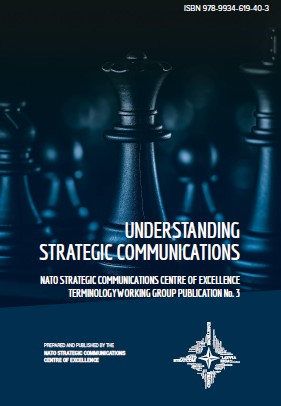
This chapter seeks to capture the different perspectives on strategic communications (StratCom) that have appeared in the first ten volumes of the Defence Strategic Communications academic journal. This emergent field will always be a work in progress and opinions will remain contested as befits any academic and praxis-oriented area of study. From seventy-eight articles the following discussion draws on twenty-five, in addition to the editor’s forewords in several volumes.
More...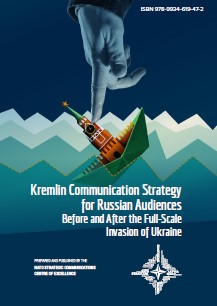
Strategic use of information is a long-term practice of the Kremlin. Concepts and methods which originated in the Soviet Union, though growing more sophisticated over time, became a blueprint for the current Russian government. Past and present leaders residing in Moscow have never been shy in calling information what it is to them—a weapon. Lenin’s Decree on the Press from 1917 warned that the press is one of the most powerful weapons, ‘no less dangerous than bombs and machine-guns’. In 2015 Russian minister of defence Sergey Shoigu repeated the same statement, saying that ‘the day has come when all of us recognize that the word, the camera, the photograph, the internet and information in general have be-come yet another type of weaponry, another branch of the armed forces’. The strategy is even more apparent when we look at the situation of the press in-side Russia (which, based on the level of restrictions and control, is not that far off from the Soviet past). As Vladimir Putin came to power in 2000, through a series of not so subtle operations (such as the takeover of the NTV channel3) and well-thought-out legal traps (the case of TV Dozhd’), media outlets which had even a fraction of independence fell under the control of the state.4 And since then the chokehold around the press has be-come tighter and tighter.
More...
An analysis of the profiles of 27 Russian journalists who have published the largest number of articles about the war in Ukraine reveals serious doubts if those people even exist in real life. In the case of the Lenta.ru outlet, the investigation revealed the use of generative adversarial network (GAN) generated images as profile pictures of the journalists. Most of the authors could not be identified due to the lack of confirmed information about them, both on the agency’s websites and on the web in general. In the case of most of the journalists analysed, serious doubts about their credibility were raised, prompted by an unusually high number of daily publications and timestamps, i.e., very short intervals between consecutive content pieces. In some instances performance outpaced the human capabilities of the writer, suggesting that the journalistic profile is a sock puppet for a group of writers or an automated bot. It is also interesting to note the common practice in Russian outlets to remove names from visible parts of the article, but still leave the author in ‘front-end source’ code. One of the possible explanations for this is that real people prefer not to be identified with the content they spread.
More...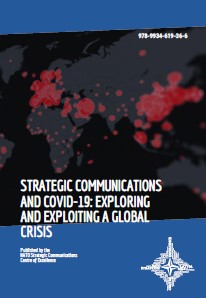
On 24 October 2021, Brazilian President Jair Bolsonaro, said in a live broadcast that ‘official reports from the UK government suggest that fully vaccinated people [...] are developing acquired immunodeficiency syndrome much faster than anticipated’. Immediately thereafter, several of his followers posted this declaration on social media despite it being a scientific and empirical absurdity. This was only the most recent of his statements during the pandemic that denied the reality and risks of the virus or promoted mis- and disinformation about Covid-19. This contributed to the creation of an alternative reality concerning the impact of the virus in Brazil. The president and many government actors discredited any scientific data or empirical evidence regarding its spread in the country. Given this context it is perhaps not surprising that Brazil became the country with the second highest Covid-19 death rate worldwide.
More...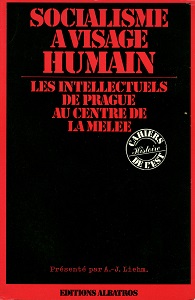
J’ai entendu et j’ai lu la déclaration des partis frères réunis à Bratislava, et à l'endroit où le joaillier stylistique a placé les participes découlant de et considérant, la mélancolie est tombée sur moi. Les gens qui se parlent à cœur ouvert, qui discutent ou qui se disputent ne peuvent pas recourir à des expressions aussi mortes. Les participes présents, les épithètes, les adjectifs exubérants sont par nature les briques avec lesquelles, depuis la nuit des temps, on édifie les déclarations. Et comme autrefois les bulles papales et les brefs, elles veulent retentir majestueusement et franchir leur époque ; elles ne cherchent pas la vérité, mais elles la proclament.
More...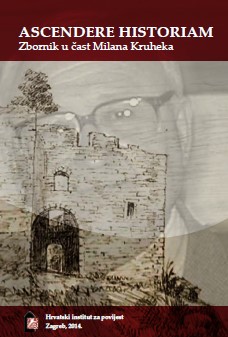
Based on the ideas of the Enlightenment as well as on the leading idea of French Revolution (brotherhood, equality and freedom), the Croatian political elites gathered around liberal press published in Zagreb at the end of the 1840 and in the beginning of the 1850, has uphold the enforcement of civil and political rights and freedoms. The basic premises was that these rights were human rights, therefore they named it “basic rights” or “free institutions of the West”, and argued that these rights are connected with the freedom of the individuals and nation. Although they argued that civil and political freedoms and rights are precondition for unobstructed and free development of the nations, they considered them unsufficient if the freedom and rights of nation is not guaranteed by the law. The most emphasised freedoms and rights were: right of freedom, equality and happiness; freedom of press, thoughts and expression of thoughts; freedom of assembling and associations; right of work; right of native language, culture and identity as well as religious, linguistic and national equality.
More...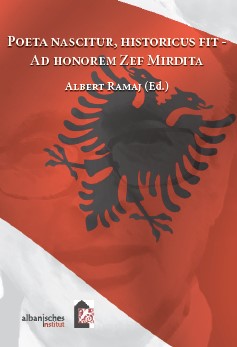
U duk sikur bora e bardhë, e bukur, mik fort i rrallë për një qytet bregdetar si Durresi, filtroi edhe më ajrin e detit dhe bëri më të tejdukshme konferencën shkencore që organizonte Qendra e Studimeve Albanologjike (Shqipja në etapën e sotme, politikat e përmirësimit dhe të pasurimit të standardit, Durrës, 16-17 dhjetor 2010). Pjesëmarrësit qenë hulumtues e dijetarë me emër prej të gjitha trojeve shqiptare dhe prej mërgatës.
More...